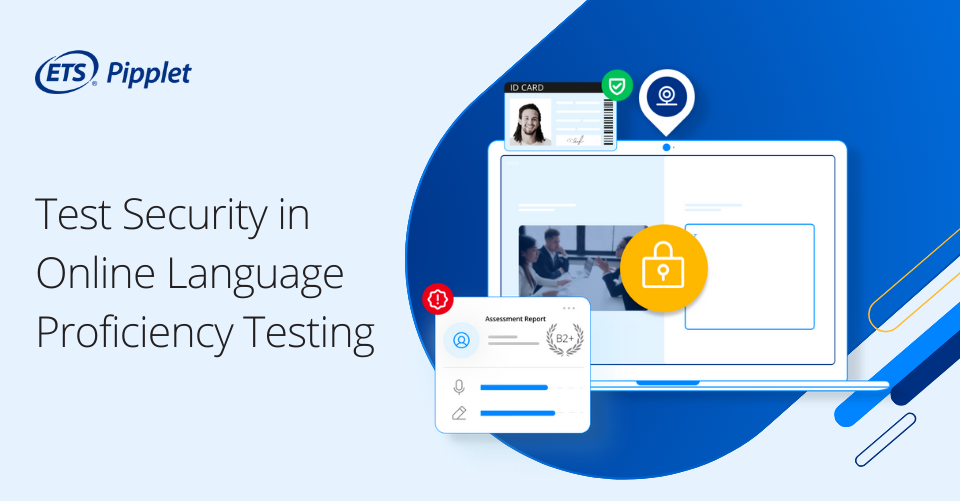How To Prevent and Detect Cheating in Online Language Testing
The shift to remote learning and working has transformed traditional skills assessment into the modern standard of remote online testing. While this brings unparalleled flexibility and efficiency, there are concerns around cheating. This article will delve into these concerns and show how remote proctoring robustly addresses them to safeguard the integrity of online assessments.
Remote Proctoring: The Keystone of Effective Online Assessments
Online assessments, such as an online language proficiency test, offer significant benefits to administrating organizations and test takers alike. For more and more organizations, choosing a remote online test becomes a natural choice—under circumstances of geographical barriers and distance, accessibility and convenience, scalability and efficiency, cost reduction, or as part of efforts to embrace digital transformation.
Without a physical proctor to monitor the test, concerns about
impersonation or cheating like using mobile phones or ChatGPT naturally arise. Thankfully, in 2024, remote proctoring technologies ensure the security of remote online testing.
Today's remote proctoring methods include:
- Real-time Automated Proctoring: The test system accesses the test taker’s webcam, screen, and microphone then uses AI to detect anomalies such as the presence of another person in the background, a different voice, or browsing the internet for answers, then locks the test taker out of the test.
- Record-and-Review: The test system records the test taker via webcam, screen sharing, and microphone without interrupting the test taker. Recordings are later reviewed for anomalies by a human proctor.
- Live Proctoring: A human proctor monitors the test takers and test environment in real-time, usually through their webcam, screen sharing, and microphone. This method requires administrators to set a common schedule with the proctor and test takers.
- Blended Proctoring: This approach uses AI for real-time visual and audio monitoring then employs human review to check any flags detected by the AI. By combining AI and human oversight, this method can detect various forms of cheating while treating unusual behavior with nuanced sensitivity.
Choosing An Online Testing Solution with Remote Proctoring

When selecting a remote online testing provider, ensure that the proctoring method employed within their solution meets your organization’s priorities for robustness in preventing and detecting cheating. This is without compromising the advantages of efficiency and the digital experience unique to remote online testing.
Pipplet’s online language proficiency testing software with its built-in
proctoring system aligns closely with best practices for overcoming remote testing challenges. It blends AI-based real-time checks and asynchronous review by language expert examiners. Key features include:
1) Identity verification
Visual Monitoring and
Stripe Identity verification help address security concerns by ensuring that the person taking the test is indeed the registered candidate. These features help mitigate the risk of unauthorized access to test materials.
2) Behavior management
Focus Track, Copy-Paste Protection, Extension Protection, and Double Human Invigilation collectively address several challenges:
Focus Track helps maintain test integrity by alerting administrators if candidates navigate away from the test window, minimizing distractions and potential cheating opportunities.
Copy-Paste Protection prevents candidates from copying and pasting answers, ensuring the authenticity of responses. The system also uses additional safeguards to detect and flag any attempts to bypass this restriction.
Extension Protection blocks and detects the use of writing aid extensions, further reducing the likelihood of cheating.
Double Human Invigilation adds an additional layer of scrutiny by involving human examiners to flag any unusual behavior, enhancing the effectiveness of the proctoring process. The report is then reviewed and validated by an internal team.
3) Contextualized reporting
Unusual Behavior Notification and
Access to Responses contribute to clear communication and transparency between administrators and candidates.
Unusual Behavior Notification alerts administrators to any violations or suspicious behavior, allowing for prompt intervention and investigation.
Access to Responses enables administrators to review all oral and written responses and snapshots, facilitating thorough analysis and ensuring fairness in the evaluation process.
These features not only
enhance test integrity but also contribute to a smoother and more transparent testing experience for examinees and administrators alike.
Conclusion
As remote testing becomes an increasingly prevalent method for assessing skills and knowledge, overcoming its inherent challenges requires implementing best practices in online proctoring.
Remote proctoring features like those in Pipplet help prevent cheating while ensuring test integrity, transparency, and a smooth digital experience. By blending AI and human oversight, organizations can confidently navigate the transition to remote assessments while maintaining a fair, transparent, and non-intrusive testing experience.
Related stories









